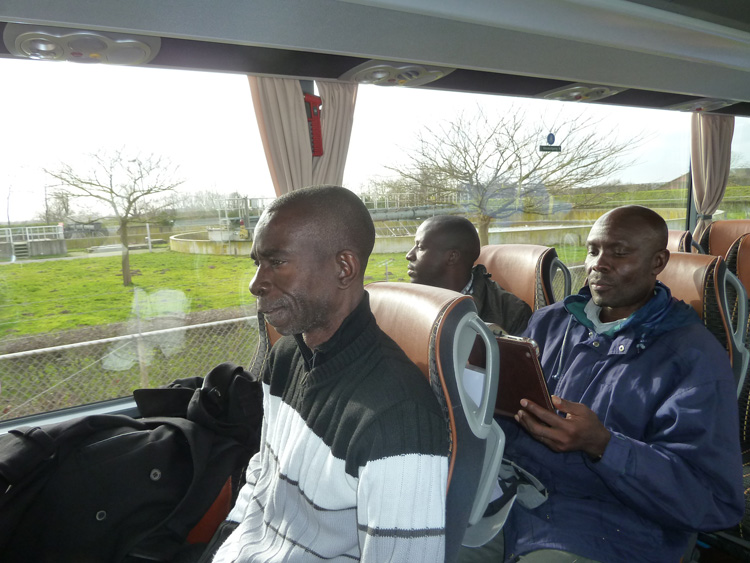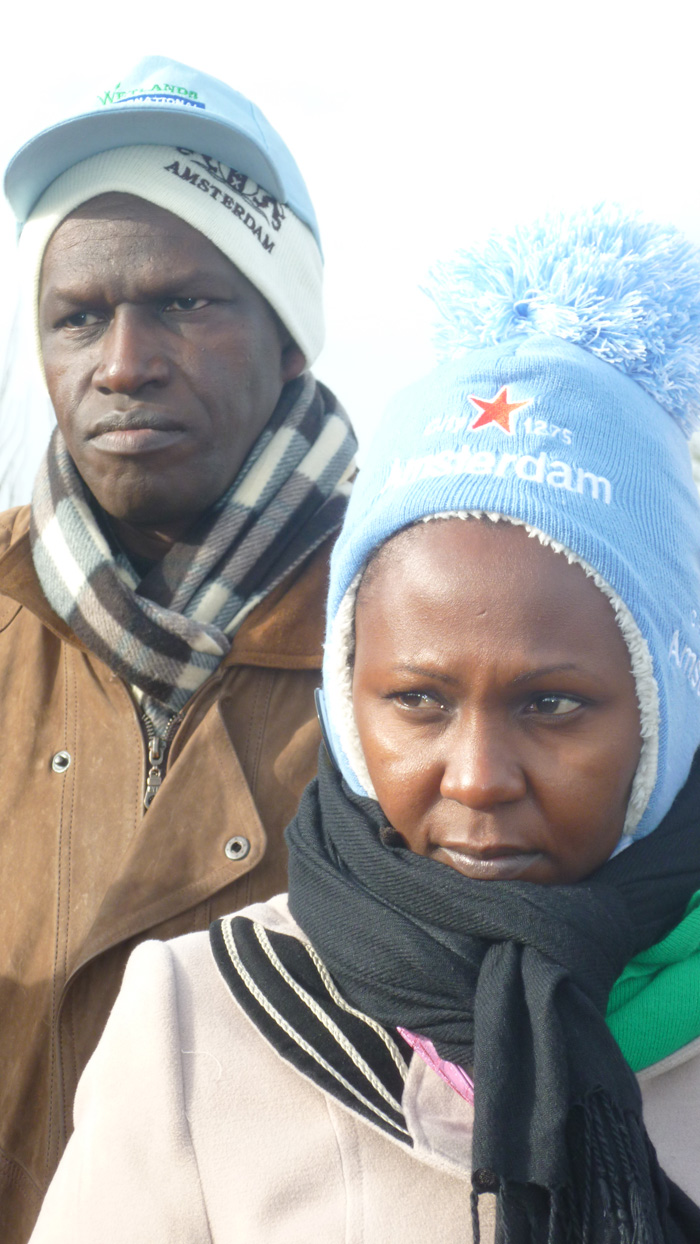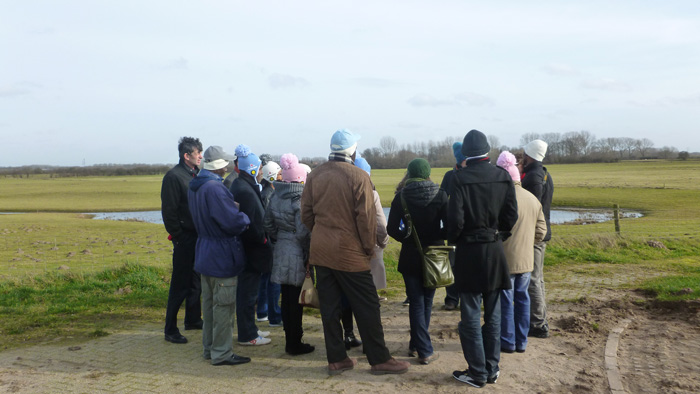Africa on the Dutch IJssel River
“I will not go!” Sena Alouka yells in the bus along the highway as we pass a desolate farm that is totally surrounded by bulldozers and soil that has been turned and ploughed. A familiar sight for most of the riders in the bus, which includes nine Africans, an Indonesian and a handful of Dutch people. Evictions and land expropriations are an almost daily occurrence in Africa and Indonesia. And then the whole group spontaneously chants: “I will not go! We will support you!”
Room for the River
It is 6 February and we are on our way to Voorst where we are going to take a look at the “Room for the River” project near the IJssel River. Sena Alouka, director of the environmental organisation JVE Togo, like the rest of the group, works on sustainable water management and the fair distribution of water in his own country. The group’s members work together with communities that all have vivid experiences of losing their livelihood when they’re suddenly faced with the fact that there are no more fish left in the river; or when the river just totally vanishes, leaving nothing to fish in; or when they discover their land and homes under water. Flooding sometimes also occurs in the Netherlands and so we are also going to see how this issue is tackled here.

Mame Latyr Fall (Forum Civil Senegal) , Dickens Kamugisha (AFIEGO Uganda), Robert Kugonza (NAPE Uganda)
Contributing to the thinking process
The involved partners all know from years of experience how difficult it is to manage water supplies and rivers in a sustainable manner and how important it is to get all of various water users (those from the neighbourhood, farmers, businesses) involved. Plans drawn up and subsequently adopted by the authorities without local consultation are pretty much doomed to fail. It is only when ideas involve the input of everyone involved and their ideas are taken seriously that one and all will sufficiently feel responsible for the success of a particular project. The magic words in this case are “participatory water management”. But our partners want to take this further: not only do the participants involved have to approve the plans but they also need to work together during the development phases.
Top-Sector Water
This method, which is called the “Negotiated Approach”, has already produced some positive results in various river basin areas around the world. Both ENDS, together with the above-mentioned African and Indonesian partner organisations, have been very active in introducing this method into practice in the regions these organisations focus on. This, however, will only succeed if local and national governments support it, and the Netherlands can potentially play an important role in this regard. The Netherlands has designated water as one of its top sectors for serious involvement. We Dutch people know better than anyone about the need to harness water and this knowledge is something we are more than willing to export.
|
|
 |
|
||
| Sena Alouka (JVE Togo) | Serah Munguti (Nature Kenya) and Papa Wawade Wade (Wetlands International Senegal) | Robert Kugonza (NAPE Uganda) |
However, we should not limit it to our technical knowledge; we should also be willing to export our water management “software”, which includes our experience with the consulting and negotiation processes, as well as our “polder model”. When it comes to water management, “software” is just as important as “hardware”. This became very clear during a recent luncheon reading organised by Both Ends on 5 February 2014 at the Ministry of Foreign Affairs, where two of our partners gave a presentation. By discussing their practical experiences in both Kenya and Togo, they were able to present a very powerful message.
Back to Voorst
Once we had arrived at the Water Board in Voorst we quickly saw with our own eyes the problematic nature of water along the IJssel. It is also became instantly clear how totally different the Dutch and African realities actually are. “How many homes end up under water here?” Serah Munguti of the Nature Kenya organisation asks the spokesperson giving us the tour of the project.
“For this particular part of the project we will need to evacuate about eight families.” Our guests stare at him in amazement. In other words, all this effort for just eight families? In Africa or Asia, a similar situation quickly means hundreds of victims. Moreover, the devastation these people experience largely goes uncompensated or under-compensated at best.
“And how much compensation do these families receive?” Munguti inquires.
“Enough to purchase a new farm, move all their belongings and start from scratch again.”

Prigi Arisandi (Ecoton Indonesia)
Prigi Arisandi, from Ecoton, an Indonesian organisation, is also very impressed. “We are already happy when the local government, after years of resistance and protest, finally relents and accepts responsibility for the quality of the water in our river. The issue of preventing flooding in Indonesia in the future has thus far remained unaddressed.”

Readiness does not cost anything
It is obvious that the Dutch model can never be transferred directly on a one-to-one basis in Africa, Asia or Latin America. In the Netherlands, they make plans for the very long term and plans are only developed after extensive studies have been performed. Meanwhile, non-Western countries tend to more readily operate in an ad hoc manner. That is not something one can change in a day. But negotiating, listening to people with practical experience, understanding one another’s point of view, considering the various interests and collectively arriving at a compromise, are certainly details that fit into many other realities than just our Dutch context. This means, first and foremost, that consciousness-raising, support and preparation are of particular importance. This is something our guests hope to take back with them from the Netherlands.
More information:
Cases and experiences of our African partners
Video about the Negotiated Approach in India and Africa
Read more about this subject
-
Letter / 22 July 2024
Joint Call to Action: International Civil Society Demands Justice for Berta Cáceres' Murder Victims in Honduras
This is a joint call to action by international civil society organizations to call upon the Honduran authorities to ensure there is justice for the victims of the murder on Berta Caceres. Eight years and four months have passed since the crime against Berta and the Honduran justice system has not confirmed the sentences of those convicted and has not prosecuted the intellectual authors. We are extremely concerned that independent administration of justice and international agreements on human rights are not being upheld.
-
 News / 17 July 2024
News / 17 July 2024EU Exits Energy Charter Treaty (ECT): A Milestone for Climate Action
The European Union's decision to exit the Energy Charter Treaty (ECT) is a landmark victory for climate action. For years, the ECT's Investor-State Dispute Settlement (ISDS) mechanism has enabled fossil fuel companies to challenge climate policies, hindering progress towards sustainability.
-
 News / 9 July 2024
News / 9 July 2024‘Dare to Trust’: Both ENDS and the Dutch Postcode Lottery team up to show the power of trust-based partnership
For more than thirty years, Both ENDS has collaborated with partner organisations around the world to advance environmental justice. Our relationships with partners, many of which span decades, are based on shared values, respect and trust. Together, we are strengthening knowledge, networks and movements, and engaging in joint advocacy aimed at bringing about a more just and sustainable world.
-
 News / 9 July 2024
News / 9 July 2024Help the fight for a world without fossil fuels: sign this initiative
The climate crisis can no longer be ignored. With record temperatures and unprecedented extreme weather conditions, we see the devastating effects of climate change all around the world. The Netherlands has recently faced both unprecedented heatwaves and prolonged rainfall that have severely impacted our agricultural sector. These events painfully highlight: we must act now.
-
 News / 4 July 2024
News / 4 July 2024Karin van Boxtel new director of Both ENDS
Karin van Boxtel (35) is the new director of environment and human rights organization Both ENDS. Karin has been running the organization temporarily, together with Annelieke Douma, since the departure of the previous director, Danielle Hirsch. She has now been appointed permanently to make Both ENDS stronger and more future-proof. Karin will take up her new post on 1 September. Until then, she will continue as co-director on an interim basis.
-
 News / 3 July 2024
News / 3 July 2024 -
 Video / 3 July 2024
Video / 3 July 2024Jonila Castro of AKAP KA & Kalikasan People's Network for the Environment
Jonila Castro works for AKAP KA Manila Bay and/or Kalikasan People's Network for the Environment (Kalikasan PNE). The livelihood of the majority of the Filipino people depends on the environment, on the seas and the lands and mountains.
-
 News / 3 July 2024
News / 3 July 2024Illegal logging is devastating Suriname's forest: The Saamaka and their fight against deforestation
The Saamaka people of Suriname have long resisted the government's violation of their land rights. Despite a 2007 ruling by the Inter-American Court of Human Rights (IACHR) against such violations, the government continues to grant logging and mining concessions on Saamaka territory without free prior and informed consent (FPIC). New report shows this has led to deforestation, land dispossession, and disruption of their livelihoods. A recent example includes a 42.7 km road built through their lands for logging access.
-
Publication / 2 July 2024
-
 Blog / 21 June 2024
Blog / 21 June 2024International coorperation - especially now!
This blog is written in Dutch
-
 News / 19 June 2024
News / 19 June 2024Recognition for PROBIOMA from the Chamber of Deputies of the Plurinational State of Bolivia
PROBIOMA have received recognition from the Chamber of Deputies of the Plurinational State of Bolivia. The presentation of this tribute took place at the Museum of Natural History Noel Kempff Mercado, in the framework of the Environment Day.
-
Publication / 18 June 2024
-
 News / 18 June 2024
News / 18 June 2024Impact of oil extraction on women's health in Bayelsa
In the context of Shell's imminent divestment from onshore oil industry in the Niger Delta, Both ENDS partner Kebetkache publishes a new report showing severe health and environmental challenges faced by the women of Otuabagi in the Niger Delta due to Shell's crude oil exploration. -
 News / 18 June 2024
News / 18 June 2024Dutch government threatens to put human lives at risk again in infamous TotalEnergies gas project in Mozambique
The Dutch government threatens to blunder again by providing export support for TotalEnergies' controversial gas project in Cabo Delgado, Mozambique. This follows from an analysis of 9000 documents from FOI requests, commissioned by Milieudefensie and Both ENDS. Anne de Jonghe, Both ENDS: “When the export support was issued in 2021, critical voices were minimized, while TotalEnergies was heard and trusted. That should not happen again."
-
 Event / 17 June 2024, 15:00 - 16:00
Event / 17 June 2024, 15:00 - 16:00Environmental Litigation: An Underestimated risk for Investors
Extreme weather events, environmental degradation and stakeholder activism force companies to reconsider climate change as an aggravating risk with tangible impacts on global supply chains, business performance, brand reputation and ESG ratings. Business strategies that neglect adequate environmental action can lead to consumer boycotts, negative media attention, investor runs and even legal action.
-
 Dossier /
Dossier /Transformative Talks
At Both ENDS we aim to connect people for change. Together with environmental justice groups from the Global South, we work towards a sustainable, fair and inclusive world.
-
 Pathway /
Pathway /Promoting people-driven solutions
Our goal is a massive upscaling and mainstreaming of bottom-up, planet-friendly practices, supported by favourable governance systems and availability of financial resources. There are many examples of successful community-led livelihood models based on collective participation, healthy ecosystems, gender justice and a vision of wellbeing beyond individual wealth. Approaches such as Regreening focus on ecosystem restoration led by forest communities or local farmers in the Sahel. These initiatives recognise and respect the interdependence between human prosperity and healthy ecosystems. They help to empower women, youth and other groups that often lack access to decision-making processes and tend to be excluded from land, water and forest management to assert their agency and rights to self-determination.
-
 Pathway /
Pathway /Supporting a powerful civil society
Our goal is that civil society can work openly and safely, make their voices heard and influence decision-making on ecosystem challenges and matters of environmental justice and human rights. A strong civil society is indispensable to a healthy society. It checks the power of both state and corporate actors, holds decision-makers accountable, and defends the rights of those marginalised from positions of influence. A strong and independent civil society can advocate for fair and ecologically responsible policies as well as challenge structural inequalities in decision-making. It can also use accountability mechanisms to seek redress for the negative consequences of such inequitable decision-making, and instead promote, implement and upscale transformative practices.
-
 Pathway /
Pathway /Advocating for just governance worldwide
Our goal is to achieve systemic change at all levels of social, political and economic institutions, to ensure that these unconditionally respect human rights and planetary boundaries. This requires policy coherence and consistent decision-making across all sectors - from trade, finance and energy to food production, agriculture, climate action and water management - and across all sections of society - from individual to family, farm, neighbourhood, city, province and national levels.
-
 News / 11 June 2024
News / 11 June 2024Stand in solidarity; sign the petition
Together with a vast majority of Dutch NGO's, political movements and other concerned professionals we have started a petition to call out to the Dutch new government to invest in international cooperation and stop the planned budget cuts (2,5 billion euros).









